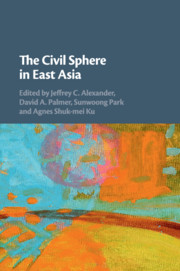Book contents
- The Civil Sphere in East Asia
- The Civil Sphere in East Asia
- Copyright page
- Dedication
- Contents
- Figures and Tables
- Contributors
- Preface and Acknowledgments
- Introduction
- 1 South Korea’s Presidential Scandal and Civil Repair
- 2 System Crisis and the Civil Sphere
- 3 Boundary Tension and Reconstruction
- 4 Performing Civil Disobedience in Hong Kong
- 5 Fault Line in the Civil Sphere
- 6 Three Moral Codes and Microcivil Spheres in China
- 7 Attempting Civil Repair in China
- 8 Fantasy Is More Believable
- 9 Institutions and Civil Instantiation
- 10 What Constitutes “Autonomy” in the Japanese Civil Sphere?
- 11 Developing Communicative Institutions in Local Communities
- 12 Reconciliation through the Transnational Civil Sphere?
- Commentary
- Conclusion
- Index
- References
2 - System Crisis and the Civil Sphere
Media Discourse on the Crisis of Education in South Korea
Published online by Cambridge University Press: 08 February 2019
- The Civil Sphere in East Asia
- The Civil Sphere in East Asia
- Copyright page
- Dedication
- Contents
- Figures and Tables
- Contributors
- Preface and Acknowledgments
- Introduction
- 1 South Korea’s Presidential Scandal and Civil Repair
- 2 System Crisis and the Civil Sphere
- 3 Boundary Tension and Reconstruction
- 4 Performing Civil Disobedience in Hong Kong
- 5 Fault Line in the Civil Sphere
- 6 Three Moral Codes and Microcivil Spheres in China
- 7 Attempting Civil Repair in China
- 8 Fantasy Is More Believable
- 9 Institutions and Civil Instantiation
- 10 What Constitutes “Autonomy” in the Japanese Civil Sphere?
- 11 Developing Communicative Institutions in Local Communities
- 12 Reconciliation through the Transnational Civil Sphere?
- Commentary
- Conclusion
- Index
- References
- Type
- Chapter
- Information
- The Civil Sphere in East Asia , pp. 38 - 59Publisher: Cambridge University PressPrint publication year: 2019
References
- 4
- Cited by



